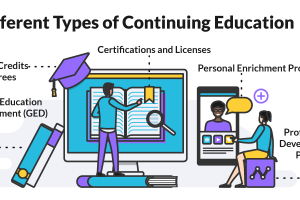Online continuing education provides accessible, flexible professional development. Technology expands options for working adults to skill up without career disruption.
This article explores the online program formats, platforms, and tools making continuing education achievable anytime, anywhere.
Self-Paced Online Courses
Self-study online courses allow professionals to upskill on their own schedule. These asynchronous courses feature:
- Prerecorded video lectures and demos
- Readings and online resources
- Quizzes and assignments with automated feedback
- Discussion boards for peer learning
According to continuing education researcher Joe Harder, self-paced courses accommodate diverse learning styles and availability. Learners control the pace and repetition.
Platforms like LinkedIn Learning and edX enable creating customized learning pathways from extensive online course libraries. And modalities like mobile access and downloads optimize convenience.
Facilitated Online Courses
In facilitated online courses, expert instructors guide learners through live and interactive sessions using web conferencing platforms. Though still virtual, facilitated courses offer:
- Live teaching and real-time Q&A
- Peer breakout discussions
- Feedback on assignments and skill practice
- Motivation and accountability to progress
“Guidance from seasoned professionals boosts online course outcomes,” notes continuing education expert Mal Fletcher. Instructors personalize support.
Facilitated courses work best for complex competencies requiring coaching and dialogue versus independent learning. Flexible schedules still accommodate work demands.
Blended/Hybrid Programs
Blended continuing education combines online delivery with limited in-person components for a hybrid experience. Popular formats include:
- Short residential intensives at the start of otherwise self-paced online courses
- Local cohort groups that meet periodically for hands-on skill practice
- Access to physical workplace simulations and equipment
- Final capstone intensives bringing remote learners together
Research shows blending online with in-person instruction provides community and deep skill application. Learners gain flexibility with some opportunity for face-to-face networking and practice.
Virtual Reality Simulations
Immersive VR training simulations use avatars, 3D environments, and gaming elements to realistically replicate on-the-job scenarios through digital role play. VR enables safely practicing high-risk, high-cost, or rare situations.
VR training is gaining traction for developing medical, aviation, leadership, and technical capabilities. Studies demonstrate VR effectively builds skills from surgery to public speaking.
“Virtual reality transforms continuing education through experiential learning,” says VR designer Questa Game. Risk-free simulations accelerate competency.
Devices like Oculus Quest make individual access user-friendly. As VR technology improves, simulations will become more pervasive.
Digital Badging and Microcredentials
Digital badges serve as electronic credentials denoting mastery of specific skills earned through online courses, projects, or assessments. Badges enable showcasing niche competencies.
Microcredentials curate badges into shareable certificates or portfolios demonstrating capability clusters like Business Analysis or Data Visualization.
“Increasingly, microcredentials verify skill attainment for career advancement,” notes continuing education scholar D. Christopher Brooks. They provide granular credentialing.
Platforms like Accredible and Credly digitally issue and manage verified badges and microcredentials. Skills-based evidence supplements degrees.
Mobile Learning
Downloadable apps and mobile-optimized websites make continuing education possible during pockets of downtime via smartphones and tablets.
Microlearning delivery through apps provides bite-sized learning on the go. Mobile access to online programs also enables learning during commutes, travel, or waiting times.
“Mobile availability means continuing education fits within the interstices of demanding lives,” explains mobile learning expert Chad Udell. Mobility expands access.
Offline capabilities, push notifications, andsummaries optimize mobile learning. BYOD policies also allow mobile access to employer-provided education.
Virtual Coaching and Mentoring
Online coaching provides personalized guidance from experienced professionals. Through secure video chat platforms, virtual coaches discuss career goals, offer strategic advice, provide accountability, and help mentees craft development plans.
According to the International Coaching Federation, over 70% of coaching now takes place online. Remote mentoring fits busy schedules.
Coaches for areas like leadership, public speaking, management, and more offer virtual coaching packages. Automated chatbots also enable basic on-demand mentoring.
Webinars and Virtual Events
Webinars and virtual conferences, workshops, and seminars provide online professional development through:
- Live or pre-recorded expert lectures and panel talks
- Q&A and polls driving engagement
- Digital handouts and resources
- Collaborative tools like live chats and shared whiteboards
“Well-produced virtual events allow remote access to leading minds and peers,” says continuing education expert Gwen Onatolu. Webinars deliver convenient learning.
Many professional associations and vendors now provide free webinars to attract audiences. Short virtual “lunch and learns” are popular for staff training.
Maximizing Online Continuing Education
Here are best practices for providers and learners to optimize online outcomes:
Providers
- Foster student-instructor and peer interaction through discussion, projects, breakouts, etc.
- Make lessons easily navigable, succinct, and digestible
- Allow practice and repetition of complex skills through simulations
- Evaluate learner progress and satisfaction frequently to improve experiences
- Use multimedia like video and infographics to present concepts engagingly
- Ensure mobile compatibility and downloadable offline access
- Provide responsive mentor guidance and technical support
Learners
- Create a designated learning space and schedule time to focus
- Master platforms and tech ahead of time to minimize glitches
- Engage actively through notes, self-quizzes, discussion posts, etc.
- Review materials and annotate key takeaways right after completing
- Apply concepts immediately at work and reflect on effectiveness
- Develop an accountability partner or group to stay motivated
“Thoughtful design and motivated learners enable online education to meet career needs,” affirms online learning researcher Dr. Peter Shea.
The Future of Online Continuing Education
Emerging technologies will enrich online learning:
- VR/AR simulations will enable realistic skill practice through roleplay avatars and interactive 3D environments.
- AI-driven personalization will point learners to custom content and tools to address skill gaps.
- Enterprise integration will provide bite-sized, hyper-relevant learning within work systems and workflows.
- Automated assessments will generate real-time analytics on mastery to guide development.
- Blockchain credentials will enable learners to showcase skills and achievements from multiple platforms securely.
“Continuing education is primed for an online-first renaissance,” says technology ethicist David Ryan Polgar. Blended with solid pedagogy, technology can democratize lifelong learning at scale.
With ever-advancing digital capabilities, high-impact online continuing education will become more immersive, personalized, and embedded in work – empowering professionals to skill up on their own terms.

















